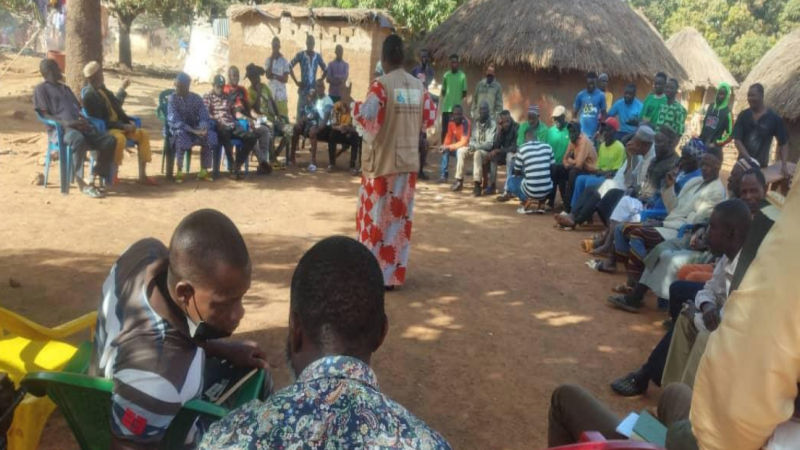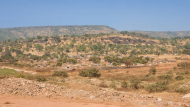Banks raised "green" finance for NordGold and then left communities affected by its Guinean goldmine stranded

A report released this week by a consortium of Guinean NGOs shows the struggle endured by the residents of Carrefour, a small village in Guinea, who for years have been impacted by the Lefa gold mine. The affected community has a simple ask: to be urgently relocated to adequate new housing away from the mine and its toxic tailings pond. Yet Nordgold, a Russian mining company, which also operates through a UK-registered plc, and which was supported by several banks in recent years to raise ESG-linked loans, is refusing to listen to them.
Six international banks provided finance to Nordgold, through two revolving credit facilities to its wholly-owned subsidiary Celtic Resources Holdings DAC. In March 2021, ING from the Netherlands, Germany’s Deutsche Bank and Austria’s Raiffeisen Bank International (RBI) provided the first $100 million loan, which was due to expire in March this year. Then in October 2021, RBI, Italy’s Intesa Sanpaolo, France’s Société Générale and Japan’s Mizuho Bank provided a second $100 million ESG loan, due in October 2024. The loans were described as “ESG-linked”, with the banks’ margins linked to Nordgold’s ESG-rating from sustainability rating agency EcoVadis.
Meanwhile, the Carrefour community, a village of over 2,000 people residing a mere 500 meters away from the Lefa gold mine, has since at least 2016 been raising concerns about the mine’s toxic tailings and other social and environmental impacts caused by the mine’s operations. These – as shown by the report – include cyanide spills, destruction of farmland, and damage to homes. Water contamination and air pollution are also constant dangers, which the residents of Carrefour desperately wish to escape.
In 2016, community representatives officially asked Société Minière de Dinguiraye (SMD), Nordgold’s subsidiary which runs the Lefa mine, for relocation. Yet, fast forward to August 2023 the residents of Carrefour are still waiting for their voices to be heard and their rights to be respected.
At the heart of the dispute between the community and SMD is that the proposed relocation site does not meet the needs of the community. The report shows that the company failed to carry out Free, Prior and Informed Consent (FPIC), which should be obtained from all local communities (including but not limited to Indigenous communities) throughout the duration of a project, according to a 2019 ECOWAS mining sector directive. In addition, the company failed to meaningfully engage with community members, excluding women and other vulnerable groups from the consultation process. The community’s letters to the SMD’s management outlining their concerns have gone answered.
“We gave up our land for the SMD mines, we gave up our land for the cyanide sludge, we lost our river which was our source of water for the women. Today, SMD is taking away everything we have left: our social, cultural and economic heritage and our reputation. We've lost everything, and there's no guarantee that tomorrow SMD won't tell us again to leave the city because there's a mine 3 km from the city. Please help us to restore or compensate for our reputation”, said a representative of the Carrefour community.
In May 2023 BankTrack appealed to Nordgold’s financiers in a letter on behalf of affected communities. Most banks’ responses made no comment on the issues raised, for example citing client confidentiality. One bank indicated that its loan had been terminated in early 2022, presumably in response to Russia’s invasion of Ukraine. Others similarly suggested they no longer have a relationship with the company and cannot do anything to support the Carrefour community. (1)
Information from financial databases indicates that both the revolving credit facilities are still active, but have not been drawn down (i.e. Nordgold has the right to withdraw the money but has not yet done so). However it may be that these databases have simply not been updated with details of the loans’ termination. In any case, none of the banks indicated they have taken any action in response to the impacts of the mine, to which they were linked through their finance.
“By the time these six major international banks approved new finance to Nordgold in 2021, the Lefa gold mine’s impacts had been ongoing for years. Banks’ due diligence processes should have flagged the severe social and environmental issues associated with the company. There is no sign that they did. Instead, banks seemed comfortable greenwashing the company as a responsible player through providing it with ESG-linked loans”, said Giulia Barbos, Human Rights Researcher and Campaigner at BankTrack.
There are increasing concerns that sustainability-linked loans are not creating the positive impacts they claim. This led the UK’s financial regulator to recently announce an investigation into the market for such loans. The situation of the Carrefour community highlights that there is also a problem of a lack of accountability associated with this kind of finance.
The Guinean NGOs’ report concludes by outlining a set of community demands for Nordgold: accelerate the resettlement process in respect of the rights of the community; adequately compensate community members; develop a participatory plan to restore livelihoods; respect the right of adequate housing; ensure respect for the rights of participation and access to information; and, ensure full participation of women and other marginalized groups in the decision making process. Their safety is at great risk, partly as a result of these banks’ inaction.
Appendix
(1) BankTrack contacted Deutsche Bank, Raiffeisen Bank International, Mizuho, ING, Société Générale and Intesa Sanpaolo. Letters are available on BankTrack’s profile of the Lefa gold mine, under “Resources”. Their responses were as follows:
-
Deutsche Bank said: “As announced in March 2022, Deutsche Bank refrains from doing any new business in Russia and we are winding down our remaining business in line with our legal and regulatory obligations. We support the decisions taken by the German government and its allies and will consistently implement the sanctions (...)”
-
Raiffeisen Bank International said: “Due to mandatory banking secrecy laws, RBI cannot comment on any status of the relationship with clients or specific transactions.”
-
Mizuho said: “It is difficult to make comments on specific cases due to confidentiality obligations; however, we shared it with all relevant internal departments.”
-
ING said: “ING did not provide direct financing for the Lefa Gold mine. ING did arrange a lending facility for Celtic Resources Holdings, a wholly-owned subsidiary of Nordgold. This facility has been canceled. It no longer exists. The purpose of the funds of the ING-arranged lending facility was Celtic Resources Holdings, not its parent company Nordgold, nor the Nordgold-owned Lefa Gold mine.”
-
Société Générale said: “The information at our disposal when we decided to participate in this general corporate purpose facility was different from the information you’re now disclosing to us. Also, our commitment has been taken in compliance with our internal rules and procedures. Please note that we are not a participant to this revolving credit facility anymore since March 2022.”
-
Intesa Sanpaolo said: “As a general policy, the Bank does not comment on individual counterparties / transactions. However, as per your specific reference to an official communication by Nord Gold plc (”Nordgold”) dated 18 October 2021, (...) the Bank clarifies that in early 2022 Banca Intesa canceled its related commitment that had not been drawn.”

